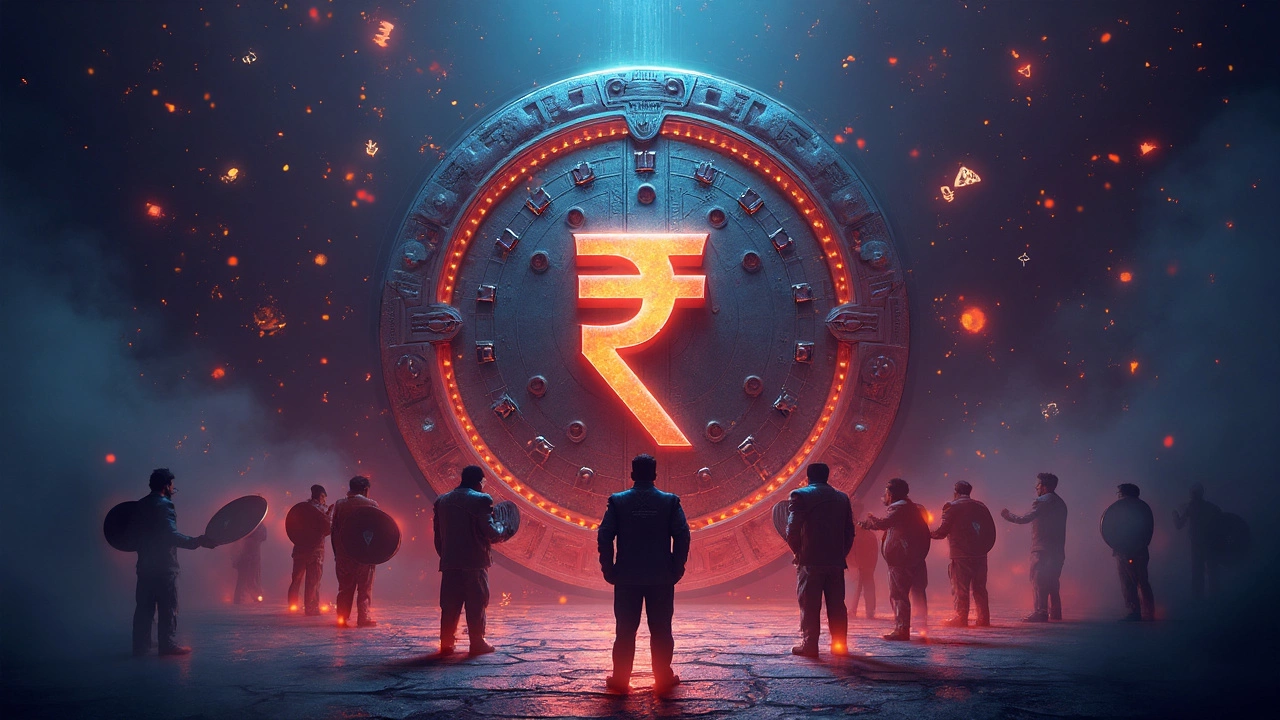
Forget fancy marketing—when it comes to picking a cryptocurrency, security actually matters. No one wants their hard-earned Bitcoin to vanish overnight because of a weak link. But what really makes a coin secure? Most people just assume popular coins are fine, but it's more complicated than that.
Let’s clear it up. Security in crypto isn’t just about the code. It's about how many people are watching over the network, how easy it is to hide your tracks if you want privacy, and how hard it is for hackers to mess with your transactions. If you’ve ever had a friend lose money in a crypto scam (my buddy Tom certainly did—lost his Ethereum to a phishing site), you’ll know how real this stuff gets.
Some coins brag about privacy, while others focus on keeping the network decentralized and tough to attack. The truth? Not all top-10 coins are equal when it comes to locking down your money. The next sections break down which coins are actually doing a good job, and where you still gotta watch your back.
- What Does ‘Secure’ Mean in Crypto?
- Bitcoin: The Original Fort Knox?
- Privacy Coins: Monero and Zcash
- Risks and Hacks: Real Stories
- How to Protect Your Crypto
What Does ‘Secure’ Mean in Crypto?
When someone asks which is the secure cryptocurrency, it’s not as simple as just naming the biggest coin. Security in crypto covers several bases—from code bugs and network attacks to privacy leaks and good old user mistakes. The tech moves fast, and so do scams.
Here’s what “secure” actually breaks down to:
- Network Security: Is the chain resistant to attacks? The more people mining or staking, the harder it is for hackers to take over. In Bitcoin’s case, that means controlling over 51% of the computing power, which is insanely expensive—think millions of dollars per hour.
- Code Quality: Does the coin have a solid track record with no major bugs? Look for a history of actual audits, not just big promises from some mystery team.
- Privacy: Some coins leave your info out in the open. Others (like Monero) are engineered so no one but you knows your transactions.
- Custody & Ownership: How hard is it for someone to steal your coins if they break into an exchange or trick you? Self-custody with hardware wallets adds a whole other layer.
If you want to see why people care so much, check out this table. It shows how much was lost in major crypto hacks over the past few years:
| Year | Biggest Single Hack (USD) | Main Target |
|---|---|---|
| 2022 | $625 million | Ronin Network |
| 2021 | $611 million | Poly Network |
| 2020 | $280 million | KuCoin Exchange |
Not all security is built the same. Bitcoin? Rock-solid network—over $800 billion market cap as of May 2025, and it’s still never been hacked at the core network level. Monero and Zcash trade some popularity for better privacy, but not every exchange wants to deal with them. Ethereum is huge, but smart contract bugs have led to some legendary losses (just ask anyone who remembers the DAO incident).
If you boil it down: the most secure coins keep their blockchains hardened against hackers, protect your privacy if that matters to you, and let you control your money—not some risky online platform. It might sound technical, but picking a secure coin just means asking the right questions (and not just following Reddit hype).
Bitcoin: The Original Fort Knox?
Ask anyone in the crypto scene about security and the first word you’ll hear is probably “Bitcoin.” Over the years, it’s earned this heavyweight status for a reason. Since launching in 2009, Bitcoin’s blockchain has never been successfully hacked, which is pretty crazy considering it handles billions of dollars daily. That’s mostly thanks to its size—no other blockchain has anywhere near the amount of miners and nodes double-checking every single transaction.
Bitcoin’s code is open-source, which means anyone with some coding chops can comb through it for problems or risks. More eyes on the code means issues get spotted and patched fast. Plus, miners all over the world secure the network by solving tough math puzzles—this is called “proof of work”—which makes it next to impossible for one group, or even a big group, to take over the system.
Here’s what really makes Bitcoin stand out for secure cryptocurrency status:
- It’s insanely decentralized. No company or single person controls Bitcoin.
- There are over 16,000 full nodes around the world making sure everyone plays by the same rules.
- The “hash rate”—which measures total mining power—hit an all-time high of 629 exahashes per second in early 2025. More mining power means more security.
- No one’s ever managed a successful “51% attack,” where a bad actor gets enough mining power to mess with transactions.
Yeah, there have been thefts, but those happened at exchanges or when people messed up their own security, like falling for phishing scams. The core Bitcoin network? It’s been rock solid.
| Year | Hack Type | Bitcoin Losses (BTC) | Network Breached? |
|---|---|---|---|
| 2011 | Mt. Gox Exchange | 25,000 | No |
| 2014 | Mt. Gox Exchange | 850,000 | No |
| 2016 | Bitfinex Exchange | 120,000 | No |
| Never | Bitcoin Blockchain | 0 | Never breached |
Bottom line? If you’re looking for the biggest, baddest digital safe for your crypto, Bitcoin’s about as solid as it gets—but only if you know how to protect your own keys and stay away from shady exchanges.

Privacy Coins: Monero and Zcash
This is where things get interesting. If you want your crypto activity to stay private, regular options like Bitcoin don’t cut it. Everything you do on Bitcoin is public forever on the blockchain, and with enough effort, people can trace your transactions right back to you. That’s why privacy coins like Monero and Zcash exist—to keep your moves on the down low.
Monero is the big name here. It hides everything: who sent it, who received it, and how much was sent. It uses some clever tech, like ring signatures and stealth addresses. Basically, even if someone has the whole blockchain, they can’t match a transaction to your identity—not unless you hand it over yourself. Security experts keep digging, but Monero is still the gold standard for privacy because it’s open source and super active with updates. Plus, more real-life criminals use Monero than Bitcoin because it’s harder to track, which might sound shady but actually proves it works.
Zcash takes a different approach. It lets you choose: you can send normal transparent transactions (like regular crypto), or you can use its special shielded addresses that keep things private using zk-SNARKs. That sounds wild but you don’t need a math degree to use it. Just know that shielded transactions are private, but they take a bit more computing power and aren’t as common because not every wallet supports them yet.
- Monero makes every transaction private by default—no action needed from you.
- Zcash gives you the option; you have to pick shielded mode if you want full privacy.
One thing that comes up for these privacy coins: some exchanges don’t list them, or they have extra rules because regulators worry about money laundering. So if you want true privacy, you’ll need to check which exchanges support them and see how easy it is to swap in and out.
For anyone who wants the secure cryptocurrency experience but doesn’t want their balance broadcasted to the world, Monero and Zcash are the top choices. Just make sure you understand the rules and check if your wallet or exchange actually handles these coins before diving in.
Risks and Hacks: Real Stories
Crypto security has been tested, and not always in a good way. There have been some jaw-dropping hacks that even got on mainstream news. The Mt. Gox disaster in 2014 is still the big cautionary tale—over 850,000 bitcoins were stolen, which would be worth billions in today’s prices. Just imagine logging in and seeing your account drained out of nowhere. Most exchange hacks actually come from poor security on the human side, not with the coin’s code.
Let’s look at some real numbers. Check out this quick table showing some of the most famous hacks and the coins affected:
| Year | Platform | Crypto Involved | Loss Amount |
|---|---|---|---|
| 2014 | Mt. Gox | Bitcoin | ~$473 million |
| 2016 | Bitfinex | Bitcoin | ~$72 million |
| 2022 | Ronin Network | Ethereum | ~$620 million |
Most hacks don’t happen because the secure cryptocurrency itself is faulty. It’s usually sloppy exchanges, people falling for phishing scams, or weak passwords. Rusty, my dog, would probably choose better passwords than some folks I know. And don’t get me started on the story of the Poly Network hack in 2021, where over $600 million was stolen by one clever hacker—who then returned it, just to make a point about vulnerabilities in smart contracts.
Another thing to keep in mind—wallets can get hacked too. Hot wallets (the ones always connected to the internet) are riskier than cold wallets. If you hear about a hack, 9 times out of 10, somebody left a digital door wide open. Cold storage, like hardware wallets, is like keeping your gold locked up in a vault that’s not even plugged in. That’s why serious traders use them for big amounts.
So what can you actually do to avoid ending up in one of these horror stories?
- Don’t leave large amounts on exchanges—move them to your personal wallet.
- Always use two-factor authentication, and never share codes or passwords.
- Be careful with links and emails about your crypto. If it looks even a little sketchy, it probably is.
- For even more safety, use a hardware or paper wallet for your biggest holdings.
Crypto can be a wild ride, but if you lock things down properly, you’ll be way ahead of the pack.

How to Protect Your Crypto
Locking down your coins isn’t something you should take lightly. Way too many folks get comfortable after their first transfer—until they realize their wallet’s been hacked.
Let’s lay out some facts. Storing your coins on an exchange? Super risky. Between 2011 and 2024, more than $13 billion worth of digital assets have been stolen thanks to hacks and ‘inside jobs’ on exchanges (source: Chainalysis 2024 Crypto Crime Report). Just last year, over $600 million vanished from two major platforms. If you don’t control the private keys, it’s not really your crypto.
"Not your keys, not your coins. Security starts from you, not just the technology." — Andreas M. Antonopoulos
So, what’s the move? Here’s what actually works to keep your secure cryptocurrency safe:
- Use hardware wallets. Devices like Ledger and Trezor keep your private keys offline. Even if your computer gets a virus, your coins won’t budge without physical access to the device.
- Enable two-factor authentication (2FA). For anything tied to your crypto—emails, exchanges, wallets—always use 2FA with an app, not just SMS. SIM swaps are a real threat.
- Keep backup seed phrases on paper. Don’t store them in your phone or computer. Write your seed phrase in pen and tuck it somewhere only you can reach. Fireproof and waterproof storage is even better.
- Double-check website URLs. Phishing is everywhere in crypto. Always type addresses manually, and never search for your wallet through Google ads.
- Update software regularly. Wallets and apps get patches for bugs all the time. Don’t skip those updates—even big names have had flaws.
- Be careful with browser extensions. Some wallet extensions have been hijacked to steal funds. Use official links from trusted sources only.
Want to see just how risky it gets? Here’s a quick look at where folks have lost money, by cause (2023 stats):
| Cause | Funds Lost (USD) |
|---|---|
| Exchange Hacks | $295 million |
| Phishing Attacks | $110 million |
| Rug Pulls/Scams | $310 million |
| User Error (e.g., lost keys) | $65 million |
Bottom line—don’t assume your crypto is safe just because you’re careful most of the time. Hackers don’t skip a day, so staying ahead with these habits keeps your money where it belongs. As someone who's had a scare or two (and who keeps Rusty’s dog treats locked up just as tight), trust me—you’ll sleep better after setting this up right.





Write a comment